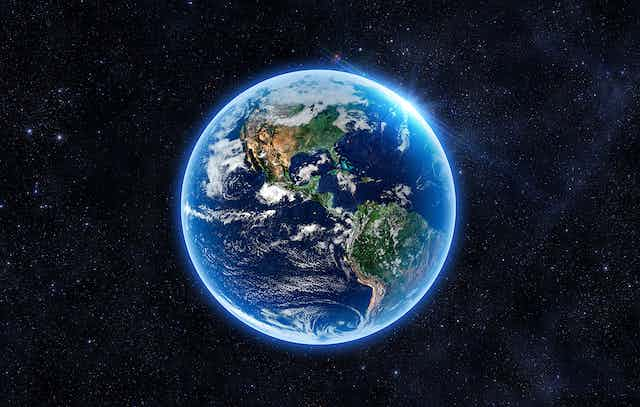World
The world is the planet Earth and all life upon it, including human civilization. In a philosophical context, the "world" is the whole of the physical Universe, or an ontological world (the "world" of an individual). In a theological context, the world is the material or the profane sphere, as opposed to the celestial, spiritual, transcendent, or sacred spheres. "End of the world" scenarios refer to the end of human history, often in religious contexts.
Etymology
The English word "world" comes from the Old English "weorold" (-uld), a compound of "weor" "man" and "eld" "age," which thus means roughly "Age of Man."
Overview
- Physical World: Refers to the planet Earth with its various geographical features, ecosystems, and the entirety of natural life it supports. This includes land masses, oceans, atmosphere, and all living organisms.
- Human World: Encompasses all aspects of human society, culture, history, and civilizations. This includes all human-made structures, institutions, and the collective knowledge and achievements of humanity.
- Philosophical and Theological Concepts: In various philosophical doctrines, the world is seen as the entirety of everything that exists, including physical matter, energy, consciousness, and the unknown. In religious contexts, the world often refers to the human experience and existence, in contrast to divine or otherworldly realms.
History
The understanding and perception of the world have evolved over time, influenced by scientific discoveries, cultural exchanges, and technological advancements. Ancient civilizations had their own interpretations of the world, often centered around myths, legends, and religious beliefs. The Age of Exploration and the Scientific Revolution significantly altered humanity's view of the world, leading to the modern understanding of Earth and its place in the Universe.
Modern challenges
In the contemporary era, the world faces numerous challenges, including climate change, geopolitical conflicts, socio-economic disparities, and the ethical implications of rapid technological advancements. Globalization has made the world more interconnected, leading to shared responsibilities and collective actions to address global issues.
Cultural Representations
Throughout history, the world has been a central theme in art, literature, music, and philosophy. It represents the entirety of human experience, from birth to death, joy to sorrow, and the mundane to the extraordinary. Cultural representations of the world often reflect the zeitgeist of a particular era or society.
Conculsion
The world, in its broadest sense, is a complex and ever-evolving entity. It is a reflection of the physical realm, human endeavors, and the intangible aspects of existence. Understanding the world requires a multidisciplinary approach, drawing from science, arts, philosophy, and numerous other fields. As humanity continues to progress, the concept of the world will undoubtedly continue to evolve, shaped by new discoveries, experiences, and challenges.
